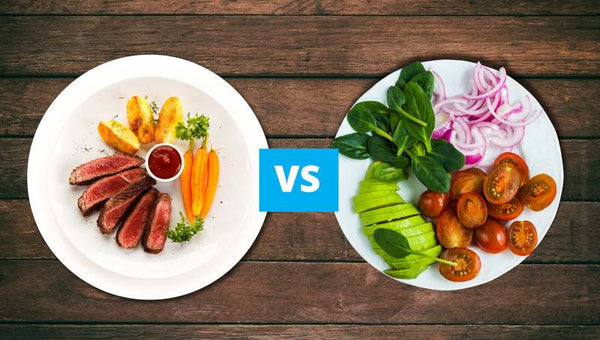Plant-Based vs. Meat-Based Diets: Which One Do I Choose?
by Elloww Team

With growing popularity around both plant-based and meat-based eating trends like paleo, it can be challenging to know which eating pattern might be right for you. Through this article, we are going to walk you through some of the pros and cons of each so you can make an informed decision keeping in mind your personal health, wellness and cultural needs!
Defining Plant-Based vs. Meat-Based Diets
There tends to be a lot of confusion over what constitutes a plant-based diet. Plant-based does not necessarily mean exclusively vegetarian or vegan. “Plant-based” implies that the majority of your diet is composed of plant foods (like fruits, vegetables, tofu, grains, legumes, etc.) but you may also include meat, fish, poultry or dairy occasionally. Through our plant-based meal plans, we offer a vegetarian plan (which does not include any animal-based foods except for dairy and eggs) and a vegan plan (which does not include animal-based foods, including dairy).
A “meat-based diet” is a term that can be used to describe popular trends that tend to include meat as a staple, like paleo or keto. The paleo diet focuses on whole foods (like meat, fish, eggs, nuts, fruits and vegetables) while eliminating grains, legumes, processed sugars and most dairy products. Our paleo meals include a variety of different protein sources and contain no processed foods or added refined sugars.
Why Choose Plant-Based Eating?
- Many studies have shown that plant-based diets can be beneficial for weight loss. A heavier emphasis on high fibre foods (like vegetables, fruits, whole grains and legumes), along with eating less processed foods can contribute to long-term weight loss.
- Plant-based diets tend to be very heart healthy! Eating a diet rich in vegetables, fruits, whole-grains, legumes and nuts has been associated with a lower risk of coronary heart disease.
- It’s better for the environment! Plant-based diets require less natural resources and are more sustainable. However, plant-based eating may take more planning and preparation time. Substituting meat with refined grains or high-salt meat alternatives has actually been associated with an increased risk of heart disease…. But! That's why we take the planning part out of it for you :)
Why Choose Meat-Based Eating?
- Diets like paleo and keto have a heavy emphasis on whole, nutritious foods including fresh vegetables, meats, fish and nuts. The eating pattern eliminates highly-processed foods (like packaged breads, cakes, chips, etc.) which often contain lots of unnecessary sugar, fat and salt.
- Early studies have shown that the paleo diet can help with weight loss, decreased blood pressure and better blood sugar control (however, there haven’t been any high quality, long-term studies done to know the long-term benefits look like).
- However, some people use this diet as an excuse to eat too much meat and not enough nutritious plant foods, including vegetables and fruits. This may actually increase your risk of heart disease if you’re consuming too much saturated fat from foods like red meat.
So What?
Overall, both diets can be healthy options! We recommend choosing the option that feels right to you based on your taste preferences, lifestyle, health history and cultural needs. Regardless of which pattern you choose, a few principles remain true:
- Focus on healthy eating behaviours like listening to your hunger cues, stopping eating when you’re full and eating mindfully.
- Focus on fresh, whole foods and minimize highly processed foods (like chips, sweets, packaged baked goods, etc.)
- Food does not act in isolation! Any diet should be paired with other health promoting behaviours like exercise and stress management.
As always, different things work for different people! Before changing your diet, always make sure to check with your doctor to see which eating pattern might be right for you.




